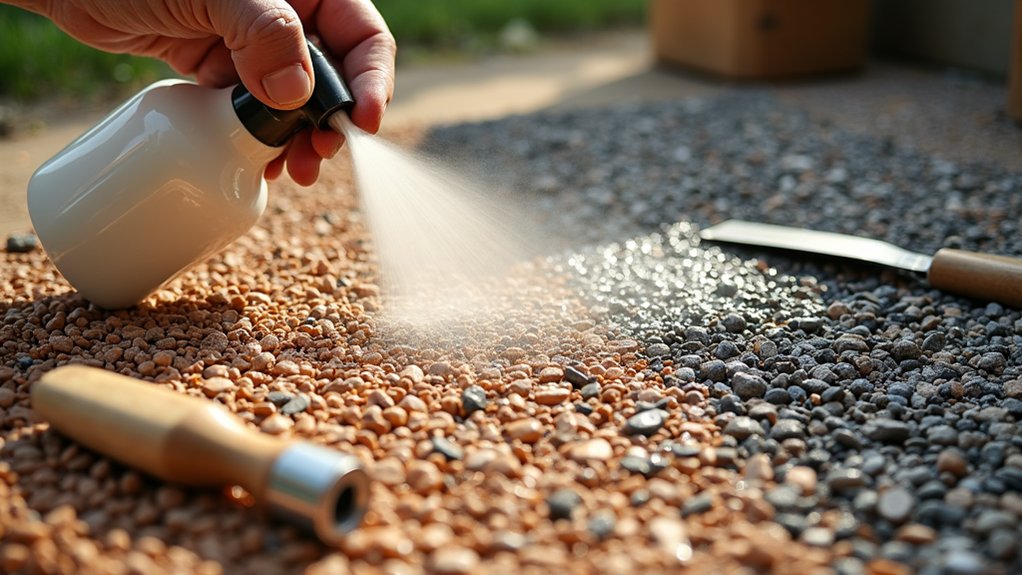Simple steps to fix discoloured resin-bound gravel:
First, spot what’s causing the problem – typically UV exposure or rust stains from metal objects. Keep your surface looking smart with basic upkeep: brush off leaves and dirt, tackle any weeds, and give it a proper jet wash when needed.
Stubborn marks need specialist resin cleaners from your local DIY shop. Once clean, apply a UV-protective seal coat – think of it as sunscreen for your driveway. It’s worth the effort, as it stops those unsightly patches from coming back.
If the discolouration won’t budge, you’ve got two choices: overlay the surface with fresh resin or replace the damaged stones. Much like touching up paint on your car, matching the colour is crucial for a seamless finish.
These fixes not only sort out the immediate problem but help your driveway stay looking fresh for years to come.
Key Takeaways
5 Steps to Fix Discoloured Resin-Bound Gravel
- Give the surface a proper clean first – sweep away leaves and dirt, then scrub with suitable cleaning solution to shift stubborn grime.
- Sort out faded patches with specialist colour restoration products – much like touching up a weathered garden fence. Pick a product that matches your original resin colour.
- For badly worn areas, applying a fresh resin layer works brilliantly. It’s pricey but gives the best results, rather like repainting a room versus just touching up marks.
- Pop on a UV-protective sealant every couple of years – think of it as sunscreen for your driveway. This stops the colour from fading in strong sunlight.
- If bits of gravel have come loose or look dodgy, replace them with matching stones. Use the same size and colour to keep everything looking neat and uniform.
Understanding the Causes of Discoloration
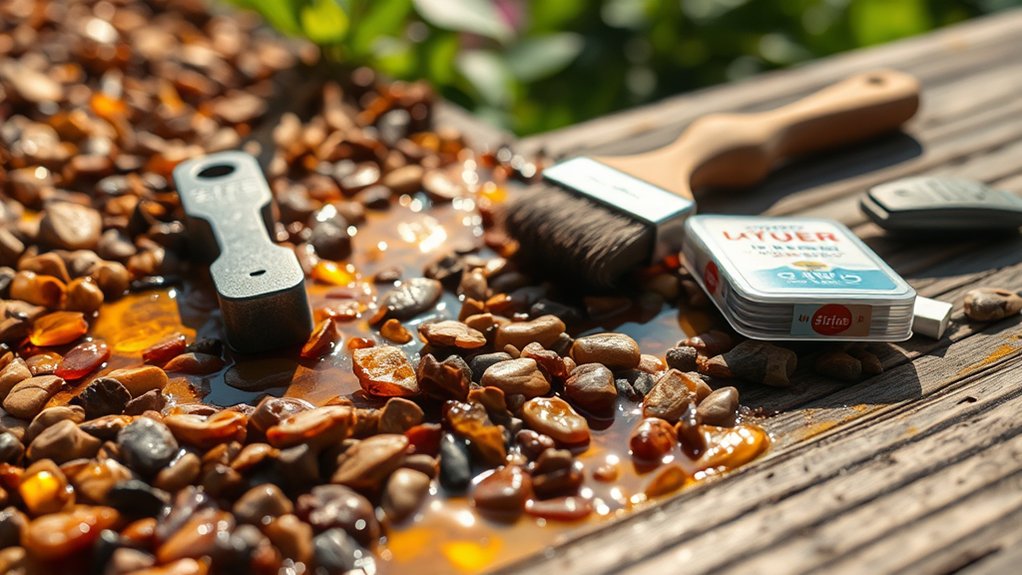
Understanding why resin-bound gravel becomes discoloured boils down to several key factors. The main culprit is usually UV light from the sun, which can fade lighter stones and break down the resin if it’s not UV-protected – much like how garden furniture fades over time. In addition, the use of UV-stable resins can significantly mitigate this issue by enhancing durability and color retention.
Rust spots often appear when metal bits react with rain and air, whilst spills from car oil or household chemicals can leave lasting stains if not cleaned quickly.
Your driveway or path might also lose its sparkle due to air pollution and regular foot traffic, rather like how your car’s paintwork dulls over time. The stones themselves can react differently to weathering, causing patchy colouring across the surface. Additionally, chemical exposure from oil or gasoline can also contribute to discoloration.
To keep your resin-bound gravel looking fresh, it needs proper protection and regular upkeep. A protective coating works like sunscreen for your surface, whilst prompt cleaning prevents long-term staining.
Choosing the Right Materials
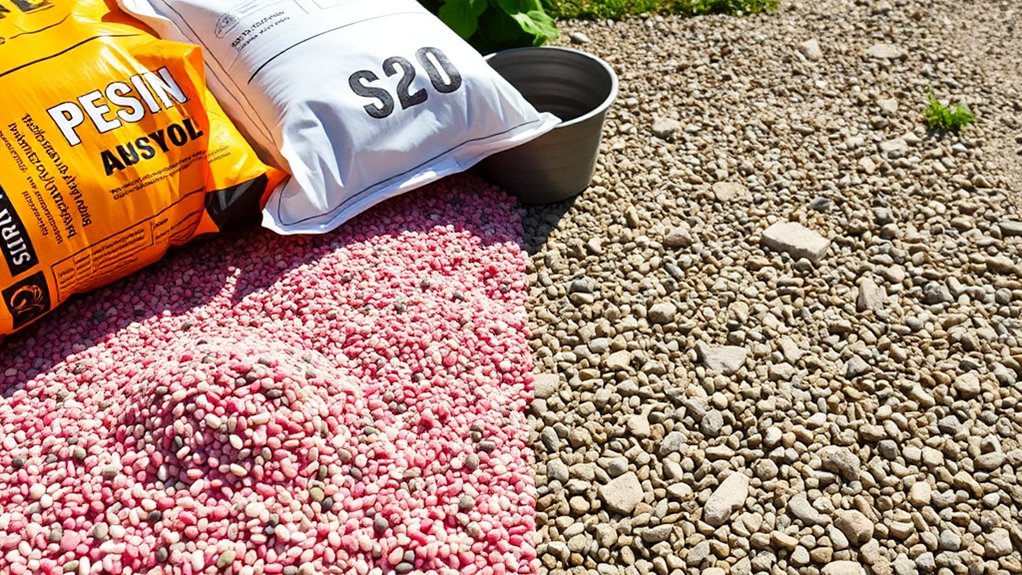
Choosing the right materials for resin-bound gravel repairs starts with UV-stable resins – they’ll keep your driveway or path looking fresh without fading in our British weather. It’s essential to ensure that your selected materials can withstand common damage types such as cracking and discoloration that may occur over time. Proper surface preparation is crucial for effective resin bonding, including thorough cleaning and sanding to enhance durability.
Pick aggregates with low iron content to avoid those unsightly rust marks that often plague UK outdoor surfaces.
For an environmentally conscious choice that works just as well, look into the growing range of eco-friendly resins available at most UK suppliers.
Think B&Q or Wickes for standard options, or specialist suppliers for professional-grade materials.
UV-Stable Resins Importance
Selecting proper materials for resin-bound gravel driveways and paths proves crucial, particularly regarding UV exposure.
UV-stable resins deliver key advantages for British weather conditions:
- Durability: These resins stand up to our varied weather, from summer sun to winter frost, without breaking down.
- Colour Retention: Your gravel stays looking fresh rather than becoming dull and patchy, much like a well-maintained garden path.
- Less Maintenance: Unlike standard resins that yellow and need frequent attention, UV-stable options keep their appearance with minimal fuss. This is because UV-stable resins enhance durability and longevity by resisting discolouration and chemical damage.
- Weather Protection: Perfect for British climate swings – handles everything from scorching summer days to autumn downpours.
Think of UV-stable resin as sunscreen for your driveway – it’s an essential layer of protection that pays off in the long run.
Low Iron Aggregates
Selecting low iron aggregates proves vital for lasting resin-bound gravel surfaces across the UK. These aggregates offer better visual appeal, maintaining colour consistency whilst preventing unsightly rust stains. When sourcing aggregates, focus on quality materials that boost durability and resist discolouration. To ensure optimal bonding and reduce maintenance issues, use washed and kiln-dried stones that provide a stronger connection with the resin.
| Aggregate Type | Key Feature | Benefit |
|---|---|---|
| Natural Stone | Natural Appearance | Blends with local landscape |
| Washed and Dried | Low Moisture | Creates stronger resin bond |
| Kiln-Dried | Fully Dry | Stops premature breakdown |
| Specialised Aggregates | Colour Variety | Bespoke design choices |
The best low iron aggregates, like those used in premium driveways across Britain, deliver both practical and aesthetic benefits. Think of it like choosing stone for your garden path – the right material makes all the difference to the finished look and longevity.
Eco-Friendly Product Options
Eco-Friendly Product Options for Resin-Bound Surfaces
Choosing environmentally sound products makes a real difference when installing resin-bound gravel. The right materials boost both longevity and eco-credentials.
- Recycled Aggregates: Use up to 80% recycled content – think crushed glass from local recycling centres or reclaimed construction materials.
- Local Materials: Pick aggregates from British quarries and suppliers – you’ll cut transport miles whilst supporting UK businesses.
- Permeable Systems: Go for surfaces that let rainwater drain naturally. Brilliant for British weather, these help prevent flooding and protect our water table.
- Green Resins: Select modern, low-emission binding agents. They’re just as tough as traditional options but far kinder to the environment.
Regular Maintenance Practices
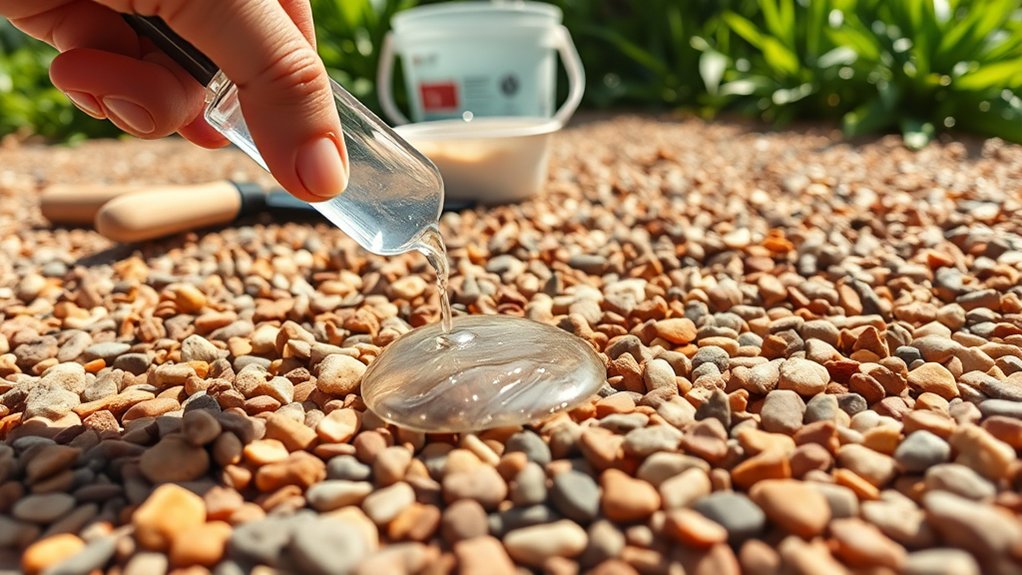
Regular maintenance keeps resin-bound gravel surfaces in top condition.
Sweep regularly with a stiff brush using circular motions to lift dirt effectively rather than pushing it around. Pay extra attention during autumn when fallen leaves become an issue.
Clear debris and loose stones with a broom or leaf blower to maintain the surface’s look and function.
Check for weeds monthly – either spray with a suitable weedkiller or pull them out by hand to prevent damage to the resin.
These simple steps help protect your investment whilst keeping the surface smart and properly draining.
Cleaning Techniques for Stains
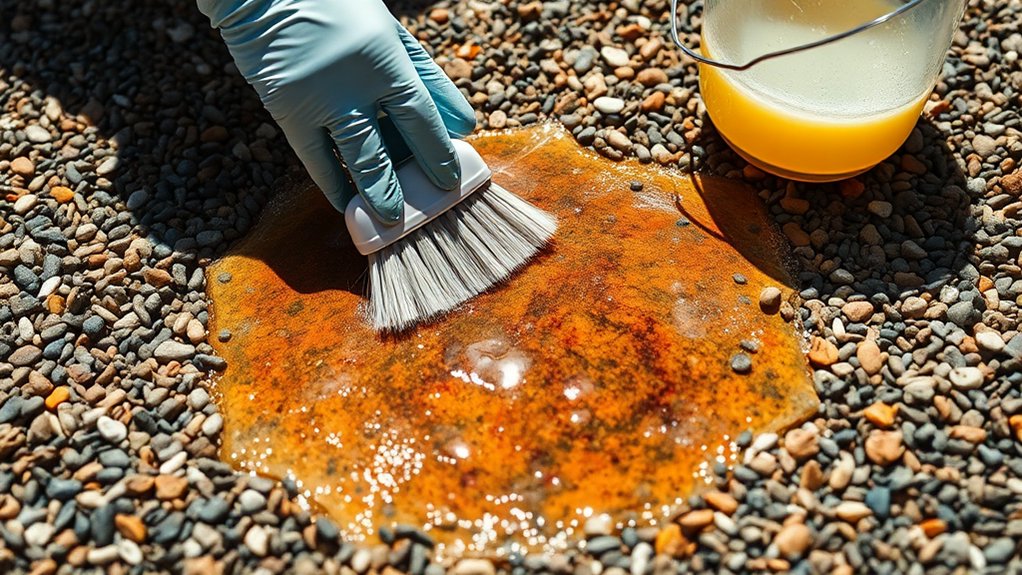
Cleaning stubborn stains on resin-bound driveways is straightforward with the right products.
Use a specialist resin cleaner from your local DIY shop – common brands like Resichem or PaveCAre work well for most marks, from oil patches to fallen leaves.
Give the surface a proper rinse afterwards with clean water to avoid any residue build-up that might damage the resin over time.
A thorough wash every few months keeps your driveway looking fresh and extends its life.
Effective Detergent Solutions
Effective Detergent Solutions for Resin-Bound Gravel
Proper cleaning solutions help maintain resin-bound gravel surfaces in top condition. Follow these key steps:
- Mild Detergents: Choose gentle household detergents (like washing-up liquid) for routine cleaning.
- Dilution: Mix one part detergent with ten parts water to prevent surface build-up.
- Application: Work the solution in with a stiff yard brush, much like cleaning a patio.
- Rinsing: Wash thoroughly with clean water until suds disappear.
Regular cleaning with these methods keeps your driveway or path looking fresh.
Strong chemicals like bleach or acid-based cleaners will damage the resin and cost you dearly in repairs.
Specialized Cleaner Options
Specialised Cleaners for Resin-Bound Gravel
Whilst regular cleaning with mild detergents maintains resin-bound gravel, tough stains require specific cleaning solutions:
| Type of Stain | Specialised Cleaner | Notes |
|---|---|---|
| Iron Stains | Oxalic Acid | Best for iron pyrites |
| Cement Marks | Hydrochloric Acid Solution | Apply sparingly |
| Oil and Grease | Industrial Degreasers | Tackles vehicle leaks and BBQ spills |
Each cleaner must be tested on a small, discrete area before full application to prevent surface damage. Always follow the manufacturer’s guidelines precisely, and wear appropriate protective equipment when handling acid-based solutions.
Rinsing Techniques Importance
Proper Rinsing for Resin-Bound Gravel
Regular rinsing is crucial for keeping resin-bound gravel looking its best whilst preventing long-term damage. The process needs careful attention to detail:
- Give your surface a thorough rinse after each sweep – it shifts stubborn dirt that brushing alone won’t budge.
- Mind your pressure washer settings – stick below 150 bar to avoid damaging the resin (about the pressure you’d use on a car).
- Soft water works best – hard water might leave chalky marks, much like those on your kettle.
- Keep water temperature lukewarm – too hot or cold could affect the resin’s durability.
Think of it like washing your car – gentle but thorough gets the best results.
Removing Rust Spots Effectively
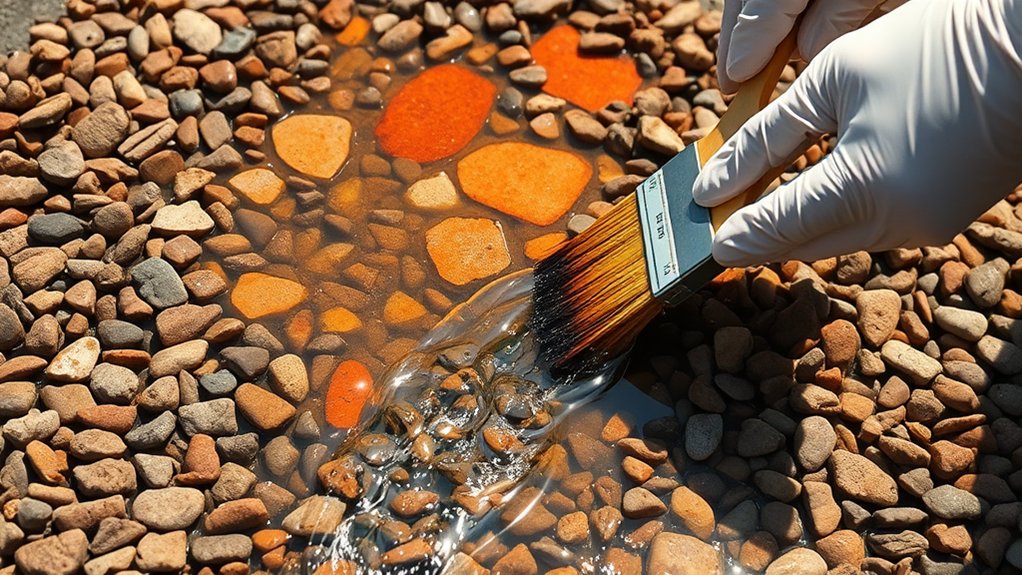
Rust spots on resin-bound gravel are common, typically caused by iron oxide in the aggregate.
To tackle these unsightly marks, opt for specialist cleaners like Stontex Rust Off – a product that actively breaks down rust deposits. Simply apply the neat solution to dry surfaces using a nylon brush, and don’t leave it for longer than 10 minutes before thoroughly rinsing.
Much like treating a rusty garden gate, it’s straightforward but needs regular attention to prevent stains from returning.
Whilst you can remove most rust spots (around 70%), some stubborn marks might remain. Still, with proper treatment and regular maintenance, your resin-bound gravel can look significantly better.
Addressing Discoloration Early
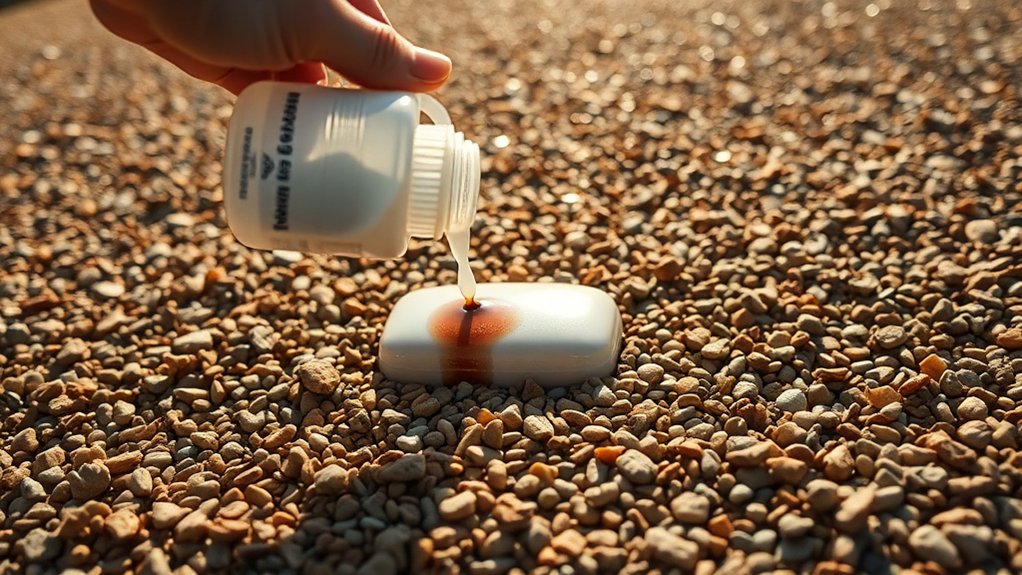
Watch for early signs of discolouration, such as patchy areas or fading spots on your resin-bound surface.
Sort any spills straightaway – particularly tea stains, motor oil or fallen leaves – to prevent lasting damage.
A quick check of your driveway or patio each month helps spot trouble early, ensuring your surface stays looking smart throughout the year.
Identify Early Signs
Early Warning Signs of Resin Drive Discolouration
Spotting changes in your resin-bound driveway early can prevent costly repairs. Watch for these key signs:
1. Colour Changes: Keep an eye out for yellowing patches, much like sun-faded garden furniture.
Common in areas with heavy sunlight exposure.
2. Staining: Look for rust-coloured marks, particularly near metal items like gates or plant pots.
3. Material Changes: Notice any differences in surface texture – similar to how tarmac changes when it starts to wear.
4. Cracking: Even hairline cracks need attention, as they’ll trap dirt and worsen discolouration.
Regular checks during your weekly garden maintenance should catch these issues before they become serious problems.
Prompt Cleaning Actions
Tackling discolouration on your resin-bound gravel driveway needs swift action. Look out for early signs like oil marks, algae growth or patchy fading.
Start with warm, soapy water or purpose-made cleaners for stubborn stains. If using a pressure washer, fit a flat nozzle and keep it 20cm away from the surface to avoid damage.
Much like caring for your car, regular cleaning stops tough stains from setting in.
Don’t use bleach or harsh chemicals – they’ll make the discolouration worse. Instead, use a soft brush to scrub gently, then rinse thoroughly.
Think of it like cleaning your patio; gentle but thorough gets the best results.
Sort problems quickly when you spot them. A well-maintained driveway not only looks smart but lasts longer, saving you money in the long run.
Regular Inspection Routine
Regular inspection keeps your resin-bound gravel looking its best and prevents costly repairs. Follow these essential checks:
- Visual Checks: Walk your driveway weekly, looking for colour changes, darker patches or wear marks.
- Clear Surface: Brush away leaves and dirt with a stiff yard brush – common garden debris can leave nasty stains if left too long.
- Power Washing: Give your driveway a proper clean with a pressure washer every few months, much like you’d wash your car.
- Water Test: Pour a bucket of water on different spots to check drainage. Standing water means trouble and could leave patchy discolouration, similar to tea stains on a white tablecloth.
A quick fifteen-minute check each week saves hours of maintenance later.
Think of it as basic housekeeping for your driveway.
Resurfacing Options for Severe Cases
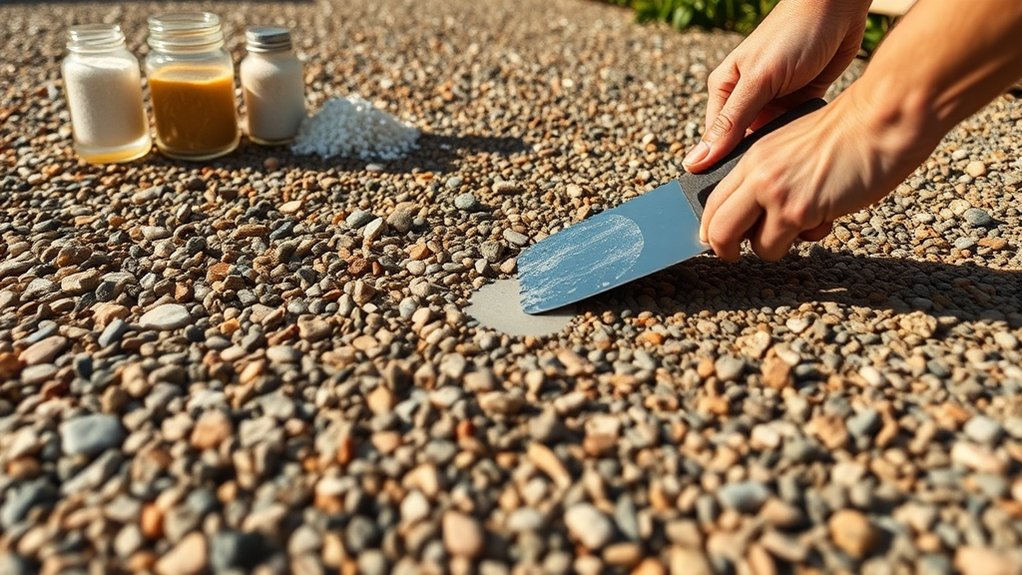
Dealing with severe discolouration in resin-bound gravel? Several resurfacing solutions can bring back your surface’s look and function. The main options include resin refreshment, sealant application and colour restoration coatings – much like giving your driveway a fresh coat of paint.
Before starting any work, proper prep is crucial. Clean the surface thoroughly (think pressure washing), check the base for damage, and fill any gaps or cracks.
| Resurfacing Method | Benefits |
|---|---|
| Resin Refreshment | Restores colour and shine |
| Sealant Application | Protects against future damage |
| Colour Restoration Coatings | Revives original appearance |
These methods work particularly well for common issues like UV fading or weather damage – problems typical in British weather conditions. Think of sealant application as a raincoat for your driveway, protecting it from our notorious wet weather.
Aggregate Replacement Process
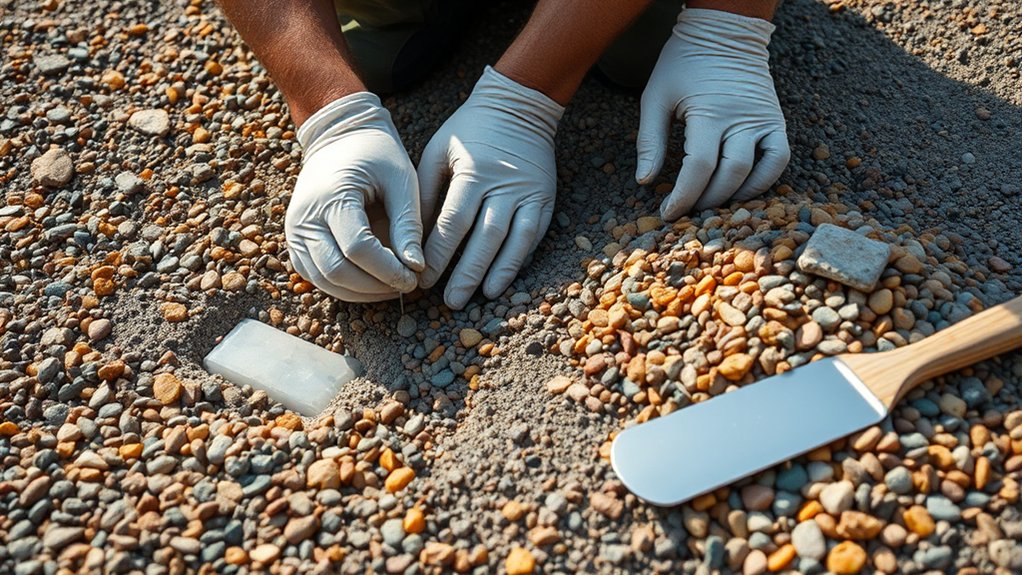
Aggregate Replacement: Essential Steps
Preparation
Clean the area meticulously to ensure proper aggregate distribution and bonding. Use a stiff brush and pressure washer for best results.
Choosing Aggregates
Select matching aggregates to maintain a uniform colour and texture across your surface. Local builders’ merchants typically stock suitable options.
Surface Check
Ensure your base is sound and level – much like preparing a garden patio. Any dips or cracks need sorting before laying new aggregate.
Work Area
Mark off and protect the repair section with masking tape and sheeting to avoid mess and cross-contamination.
This straightforward process works well for both small patches and larger areas needing attention.
Most DIY enthusiasts can handle small repairs, though larger jobs might need professional help.
Applying a Resin Overlay
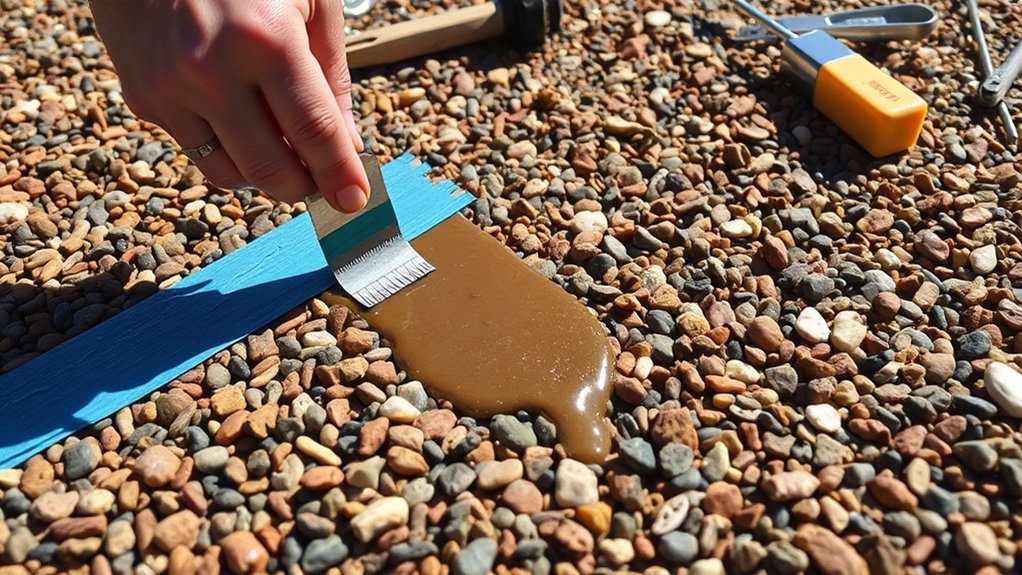
A well-laid resin overlay begins with proper preparation of your resin-bound gravel surface. Start by checking for cracks and uneven areas across the surface. Give the area a thorough clean to help the new resin bond properly, and sort any repairs before moving forward. Consider how much foot and vehicle traffic the surface will need to handle.
| Step | Action | Purpose |
|---|---|---|
| Surface Check | Look for damage | Check if overlay is suitable |
| Clean & Repair | Clear debris, mend cracks | Create strong bonding surface |
| Choose Materials | Pick resin and aggregate | Match existing surface quality |
Spread the resin binder evenly across the surface, scatter the aggregate, and smooth carefully for a professional finish.
Future Prevention Strategies
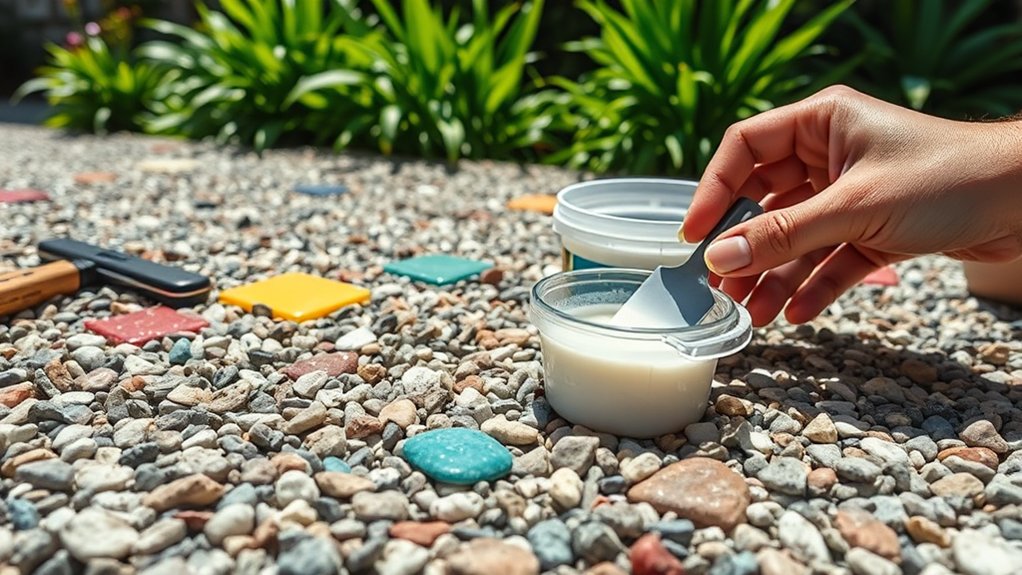
Future Prevention Strategies
Keeping your resin-bound gravel looking smart needn’t be complicated. These practical steps will help protect your surface from wear and damage:
- Regular Cleaning: Simply sweep once a week and give an occasional gentle wash with plain water – much like caring for your patio.
- Weed Control: Spot and pull any weeds straight away. If needed, use garden-safe weedkillers that won’t harm the resin.
- Seasonal Maintenance: Clear fallen leaves before winter sets in. When it snows, opt for salt-free de-icers to prevent surface damage.
- Protective Coatings: Use UV-protective sealants every few years – they work like sunscreen for your driveway, keeping the colour fresh and stopping stains.
Frequently Asked Questions
How Long Does Resin-Bound Gravel Typically Last Before Discoloration Occurs?
Resin-bound gravel surfaces maintain their colour for 15-25 years, much like a well-kept garden path. The longevity depends heavily on three key factors: the quality of resin used (premium brands tend to perform better in British weather), proper installation by qualified professionals, and the amount of direct sunlight the surface receives. Think of UV exposure like sunbathing – the more time spent in direct sun, the more likely you’ll see fading, particularly in south-facing areas.
Can I Use Vinegar to Clean Resin-Bound Gravel Surfaces?
Vinegar works well on resin-bound gravel, but always dilute it with water first. For a gentler approach, opt for baking soda or eco-friendly washing-up liquid – both common household items that won’t damage the resin binding. Whatever you choose, give the surface a thorough rinse with clean water afterwards to prevent any residue build-up.
Is It Safe to Power Wash Resin-Bound Gravel Driveways?
Power washing is indeed safe for resin-bound gravel driveways, provided you use the correct pressure settings. Set your washer to a moderate pressure and keep the nozzle at least 30cm from the surface – much like cleaning a car. This approach removes everyday grime, moss and leaves without risking damage to the resin bonds.
What Are the Signs of Permanent Discoloration in Resin-Bound Gravel?
Permanent discoloration in resin-bound gravel typically shows up as stubborn patches of fading, much like an old garden cushion that’s been left outside. Yellowing patches and dark spots that won’t budge after a thorough clean are telltale signs of lasting damage.
How Can Weather Conditions Affect the Repair Process for Discoloration?
Weather significantly affects repair work on discolouration. The best results come from dry, mild conditions typical of British summer days, whilst rain and damp can prevent proper bonding of repair materials. Cold snaps below 10°C or scorching days above 25°C may also interfere with curing times. Worth scheduling repairs during stable weather periods for optimal results.
Conclusion
Regular maintenance of resin-bound gravel is essential for keeping its colour intact. Professional cleaning and proper care can double the lifespan of your driveway or path. The key is spotting discolouration early and taking swift action. Common issues include oil marks from vehicles, leaf stains and weather damage – all of which respond well to timely treatment. For stubborn stains, a pressure washer on a low setting or specialist cleaning solutions work effectively. If the surface shows widespread fading, consulting a local specialist about resurfacing might be the most cost-effective solution. Simple preventive measures, like regular sweeping and prompt stain removal, help maintain your gravel’s appearance throughout the seasons.
